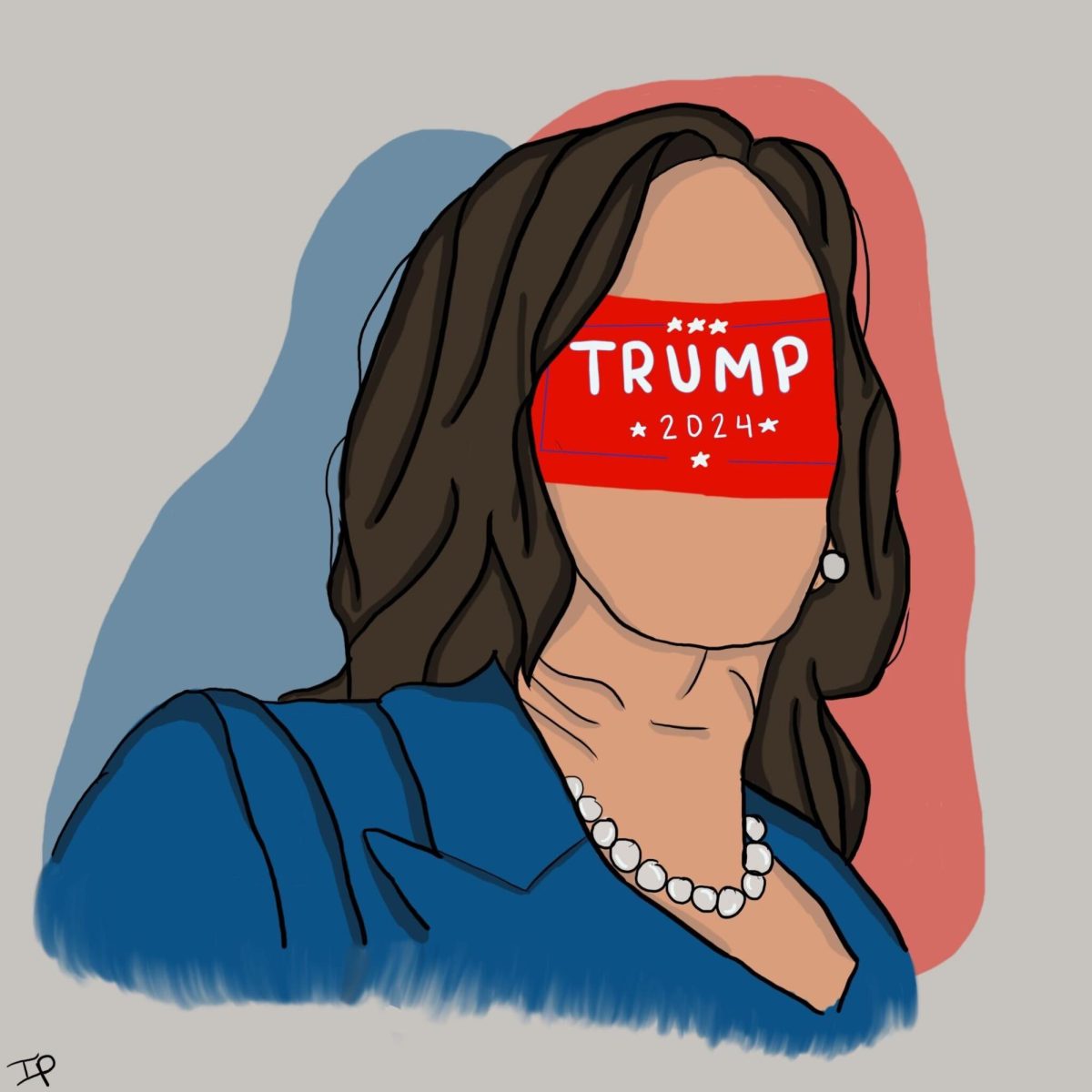I am tired of acting like Vice President Kamala Harris’s race doesn’t already play a large role in the upcoming 2024 presidential election. In recent weeks, it has been hard to find a headline that doesn’t mention, question or weaponize her race. As a mixed woman, I find this incredibly frustrating — and a waste of time — given the major issues at stake in the 2024 presidential election.
Kamala Harris is mixed-race. She is the daughter of two immigrants, a Jamaican father and an Indian mother who immigrated to the U.S. during the Civil Rights Movement. Her father was an economics professor at Stanford University and her mother was a biomedical scientist at McGill University. Harris notes that her mother decided to raise Harris and her sister, Maya, as Black because that is how “the world would see them first.”
While Harris attended Howard University and continues to have close connections with her alma mater, Alpha Kappa Alpha, this does not dismiss her Indian identity. Harris has mentioned that she hosts Diwali and as well as Eid celebrations at her home to show up for South Asian American communities. The name Kamala, meaning “lotus” in Sanskrit, is something she takes pride in.
Harris is going through what nearly every multiracial individual goes through, but is doing it directly in the public eye. Being multiracial comes with people inevitably trying to categorize you — you can’t be both, you have to be one or the other. In my case, I can’t be Black and Guatemalan — I have to be Black or Guatemalan. For Harris, she can’t be Black and Indian — she has to be Black or Indian.
This isn’t new for the presidential nominee. When she first ran for president in 2019, the Black community was quick to question if she was “Black enough” which led to the viral radio clip of her stating, “I was born Black. I will die Black, and I’m not going to make excuses for anybody because they don’t understand.”
In this current election cycle, Donald Trump and other Republican groups are coming for Harris and her racial identity. At the end of July, former president Trump made immensely disrespectful remarks about Harris at the National Association of Black Journalists convention. In between dodging every question and mispronouncing her name every time (it is pronounced comma-la, by the way), he was asked if he agrees with the Republicans who have stated Harris only has political power due to diversity, equity and inclusion initiatives. More specifically, the panel was alluding to Republican Rep. Tim Burchett, who referred to Harris as a “DEI Vice President” on the social media platform X, formerly known as Twitter.
In true Trump fashion, the former president clapped back by asserting Harris has changed her racial identity when he said stating, “She was always of Indian heritage, and she was only promoting Indian heritage … I didn’t know she was Black until a number of years ago when she happened to turn Black, and now she wants to be known as Black. So I don’t know, is she Indian or is she Black?”
To no one’s surprise, Trump’s ignorant comment spurred even more conversations and questions about Harris’s race. Seeing Fox News’ “The Five” segment or Republican strategist, Shermichael Singleton on CNN spend time discussing Harris’s race as Black or Indian instead of talking about important policy and polls fills me with indignation as an American and as a multiracial woman.
Two weeks ago, the Republican National Federation of Republican Assemblies cited the 1857 Dredd Scott decision to argue that it is unconstitutional for Harris to run for president. The Dred Scott decision was a landmark decision stating that enslaved people did not count as citizens of the United States and thus were not protected by the government or the courts. In this group’s policy document, they noted that “No person except a natural-born Citizen, shall be eligible, or a Citizen of the United States, at the time of Adoption of this Constitution, shall be eligible to the Office of President.”
According to the Dred Scott decision, a natural-born citizen is born in America to parents who are also citizens at the time of birth. Essentially, the NFRA built an argument that Harris would not count due to both of her parents not being “American citizens at the time of [her] birth.”
This group also identified Nikki Haley and Vivek Ramaswamy, who appeared on the Republican ballot for this election, as people who should be unable to run. What this group failed to recognize is that this interpretation would have made numerous presidents unable to hold office — including George Washington, James Madison and Thomas Jefferson — whose parents were born in the British colonies.
Not only is their reasoning absurd, but it is also blatantly racist. This “line of reasoning” NFRA used to justify Harris’s ineligibility is analogous to the extremely dated hypodescent or “one drop rule.” This asserts that one drop of Black blood makes a person Black. Therefore, anyone with a Black ancestor would be considered and treated as a fully Black person. In its anthropological definition, hypodescent assigns a multiracial individual to the subordinate racial group. Bringing back these dated court decisions elucidates the racist origins that American democracy was founded on and should have no place in the current Presidential race centuries later.
In even more recent news, Harris has been repeatedly criticized by the GOP for suddenly developing a “southern accent” in recent campaign rally speeches. During a White House briefing last Tuesday, Fox News correspondent Peter Doocy asked press secretary Karine Jean-Pierre, “Since when does the vice president have what sounds like a Southern accent?.” This was referring to the Labor Day speeches Harris gave to the union audience in Detroit and Pittsburgh. Critics are utilizing social media to call Harris “cringe and fake”.
This isn’t new. The same thing happened to former President Obama when he gave a speech about poverty at Georgetown University and was questioned on his authenticity. The most cringeworthy aspect of all of this is the fact that we are presuming how Black people should talk, and when they don’t fit into the unrealistic expectation, we begin to question their Blackness. Harris was born in Oakland, California. She is a soror in one of the oldest black sororities in the country, attended one of the country’s top historically Black universities and then pursued a career as a prosecutor and politician. All aspects of her life play a role in how she speaks. What Harris does is what many Black people do — code-switching.
Maya Angelou beautifully explains code-switching in her novel “I Know Why the Caged Bird Sings,” stating “We learned to slide out of one language and into another without being conscious of the effort. At school, in a given situation, we might respond with ‘That’s not unusual.’ But in the street, meeting the same situation, we easily said, ‘It be’s like that sometimes.’”
While Jesse Waters asserted on Fox News that Harris sounds “like Fani Willis,” a Black district attorney in Fulton County, Georgia, with a notable Southern accent, who she really sounds like is Kamala Harris — the current presidential nominee, prosecutor, California native, Howard alum and proud multiracial woman.
Since middle school, I have been told I don’t sound Black, or that I act like the whitest Black girl ever. Seeing this same thing happening to a woman who looks like me in one of the most important elections makes me fearful of how backward we are sliding as a nation. These comments don’t make one party seem stronger than the other — what they do is further instill a stereotype separating Black people from the general population. The media needs to stop caring about what Black people sound like and start listening to what we are saying.
The dated rhetoric and references being used against Harris are precisely the echoes of history that she is trying to dismantle as the first Black woman to secure a party’s nomination for president. Invalidation of identity is harmful as it is, but when it is within our current political system, it establishes a false notion that racial identity is grounds to question leadership eligibility. Kamala Harris is a proud Black and Indian woman running for president. Let’s focus on the policies of 2024, not 1662.
Grace Harris has a passion for social justice and advocacy. Her email is always open to more ideas — gmh66@pitt.edu



